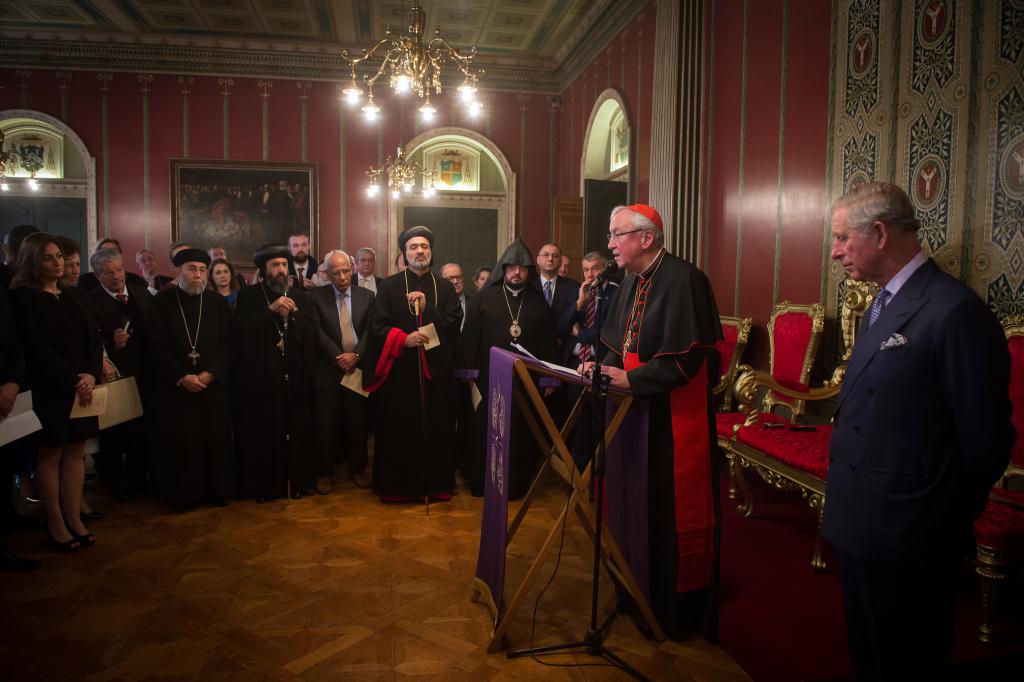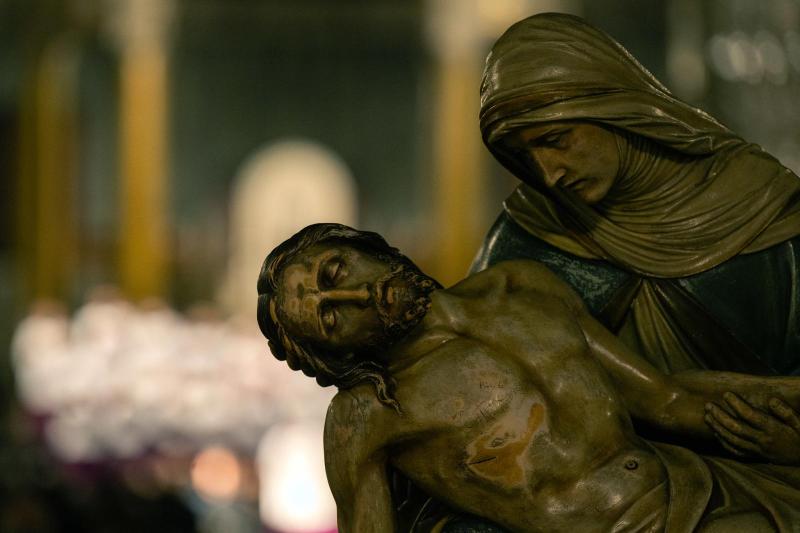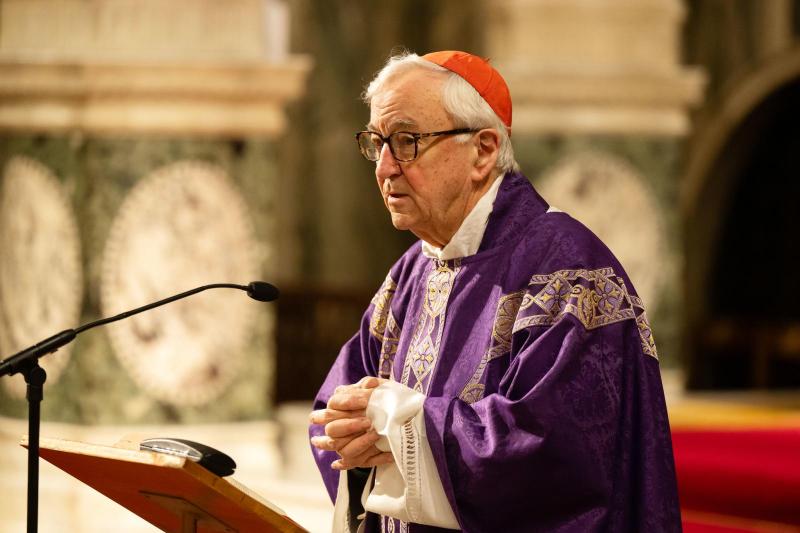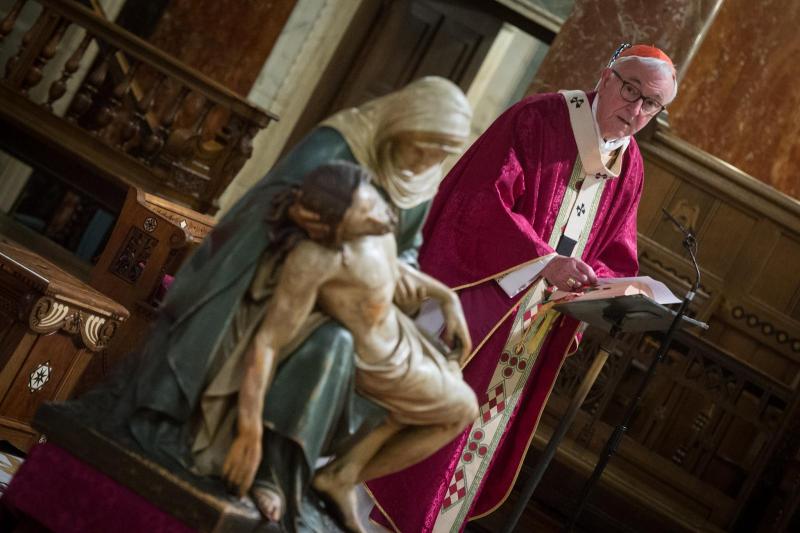The Prince of Wales today met with Christians from the Middle East at an Advent reception, hosted by Cardinal Vincent at Archbishop’s House in London.
Representatives from the Chaldean Catholic, Syriac Catholic, Maronite Catholic, Coptic Orthodox, Armenian Apostolic and Greek Catholic Melkit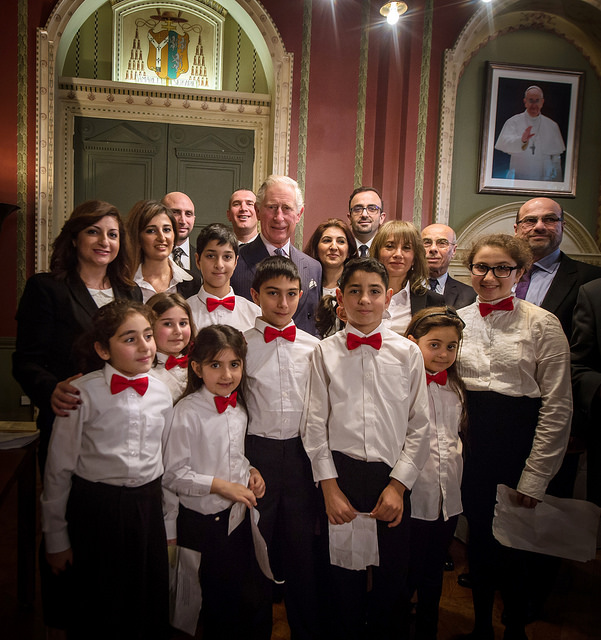 e Churches were present. The Prince also met guests and representatives from charities including Iraqi Christians in Need, Friends of the Holy Land, Aid to the Church in Need and Jesuit Refugee Service. The gathering heard a choral piece by the Chaldean Church's adult choir and a choral piece by the Chaldean Church's children's choir. The event concluded with intercessory prayers for Christians and other minorities suffering persecution in the Middle-East.
e Churches were present. The Prince also met guests and representatives from charities including Iraqi Christians in Need, Friends of the Holy Land, Aid to the Church in Need and Jesuit Refugee Service. The gathering heard a choral piece by the Chaldean Church's adult choir and a choral piece by the Chaldean Church's children's choir. The event concluded with intercessory prayers for Christians and other minorities suffering persecution in the Middle-East.
The Prince of Wales told the gathering of his visits to the region and the testimonies he had heard from those suffering as a result of the violence.
'At this traditional time of prayer and reflection on the mystery of the Incarnation, it seems to me vital that we pause for more than a moment to think about the plight of Christians in the lands where the Word was actually "made flesh and dwelt among us', he said.
'This is what makes the plight of our fellow brothers and sisters in Christ so especially heart-breaking. Their suffering is symptomatic of a very real crisis which threatens the very existence of Christianity in the land of its birth... Consequently, the greatest challenge we face is how to ensure that the spiritual and cultural heritage of Christianity in the Middle East is preserved for future generations - quite apart from doing all we can to provide practical support to those who are persecuted.
'I could not be more heartened, therefore, to witness at first-hand the way in which each of your church communities is continuing to live the faith of your Fathers. By protecting the wisdom which has been handed down to you, you are doing your utmost to ensure that there is a future for your children and grandchildren.'
Cardinal Vincent called for prayers for all those suffering as a result of the continuing conflicts and violence across the Middle East. He recognised the suffering of Muslims, Yazidis and all those slaughtered for their faith, caught up in violence or driven from their homes in the continuing conflicts. However, at this time of Christmas and in this country he said there should be a particular concern for those who suffer for the name of Jesus Christ.
The Cardinal also thanked the Prince of Wales for his leadership and insistence in this matter at a time when there was a danger in the UK of losing sight of the Judeo-Christian foundations of our society.
'As a society we strive to offer respect to all people, but forget that such respect is due because of the God-given dignity of every human being. We rejoice in the compassion and generosity which characterise this country, but we may fail to remember that they are rooted in Biblical imperatives, just as is our administration of justice. Our tolerance and readiness to make space for each other has its roots in the imperative to forgive those who may offend us. And the trust needed for so many of our transactions is ultimately rooted in the fact that we have one Heavenly Father and that in Him we are brothers and sisters. In nurturing these practical values by which our society strives to live we do well to recognise that our Christian heritage as a huge and powerful resource.'
The full text of Cardinal Vincent's address can be read here.
The text of HRH the Prince of Wales' address follows:
HRH The Prince of Wales
Having just come from helping to celebrate the 175th anniversary of the West London Synagogue, it is a very great pleasure to be with you in this season of Advent - a time when we prepare to celebrate the mystery of the Incarnation. I am so grateful to His Eminence, Cardinal Nichols, for his generosity in hosting this reception at the start of this pontifical Year of Mercy.
Just over two thousand years ago, Christianity was quite literally born in the Middle East. It therefore seems especially fitting that so many representatives of what I might call the "Middle Eastern" churches are gathered here today. Many of your church communities link straight back to the early Church – indeed, if memory serves me correctly, the Coptic Orthodox Church traces its roots right back to Mark the Evangelist!
Tragically, as many of you will know far, far better than me, this remarkable heritage is under threat as never before. Christian communities in various parts of the Middle East are being deliberately targetted by fanatical Islamist militants intent on dividing communities which have lived alongside one another for centuries.
The impact that all this unmentionable violence and cruelty has had on individual lives is utterly heart-breaking. Earlier this year I spent time with three remarkable people who had been subjected to indescribable levels of barbaric horror, including a Jesuit priest working in Homs in Syria and a Chaldean Catholic priest from northern Iraq who had been kidnapped by Da'ish., beaten horribly, threatened daily with beheading, but never, never renounced his faith nor, ladies and gentleman, his extraordinary capacity for forgiveness. Their heart-rending testimonies were a powerful reminder – if, indeed, such a reminder is needed – of the terrifying depths to which people will sink in the name of so-called "faith".
Of course, I am only too aware that Christians are not the only faith community in this region suffering at the moment. So many of Da'ish's victims are Muslims. And who can forget the horrific suffering of the Yazidi community in Iraq? Furthermore, the Middle East is not the only part of the world in which Christians are suffering. The third remarkable person I met earlier this year was a fifteen year old Nigerian girl who was abducted by Boko Haram, forced to watch other girls being beheaded or - quite beyond all belief, in terms of depraved cruelty - buried alive with just their heads above ground, exposed to vultures and other birds.
At this traditional time of prayer and reflection on the mystery of the Incarnation, it seems to me vital that we pause for more than a moment to think about the plight of Christians in the lands where the Word was actually "made flesh and dwelt among us". For, despite what the brainwashed militants would have people believe, Christianity is not a "foreign" religion. As the atmospheric Chapel of St. Ananias in Damascus and countless other holy sites bear witness, Christianity has been part of the rich tapestry of life in the Middle East for two thousand years. And it was the early Middle Eastern church communities in places such as Antioch, Alexandria, Bosra in Syria, and Mesopotamia which eventually brought Christianity to Asia and the West. To take just one example, the Armenian Apostolic Church – which, of course, is the oldest Established national church in the world – traces its origins to the Apostles Bartholomew and Thaddaeus. And, ladies and gentleman, it is, perhaps, worth remembering that those of us who are members of the Church of England will be only too familiar with the Nicene Creed, whose words were first formulated in the Middle East in the fourth century. Far from Christianity being a "Western" religion, Christianity was born in – and shaped by – the East…!
This is what makes the plight of our fellow brothers and sisters in Christ so especially heart-breaking. Their suffering is symptomatic of a very real crisis which threatens the very existence of Christianity in the land of its birth. In fact, according to Aid to the Church in Need, Christianity is on course to disappear from Iraq within five years, unless emergency help is provided on a greatly increased scale at an international level. This affects us all. Consequently, the greatest challenge we face is how to ensure that the spiritual and cultural heritage of Christianity in the Middle East is preserved for future generations - quite apart from doing all we can to provide practical support to those who are persecuted.
I could not be more heartened, therefore, to witness at first-hand the way in which each of your church communities is continuing to live the faith of your Fathers. By protecting the wisdom which has been handed down to you, you are doing your utmost to ensure that there is a future for your children and grandchildren.
Above all, ladies and gentlemen - and however inadequate they may be – my special prayers are with you and all those in the Middle East and elsewhere who suffer iniquitous atrocities and perfidious persecution for whatever faith they may belong to.
